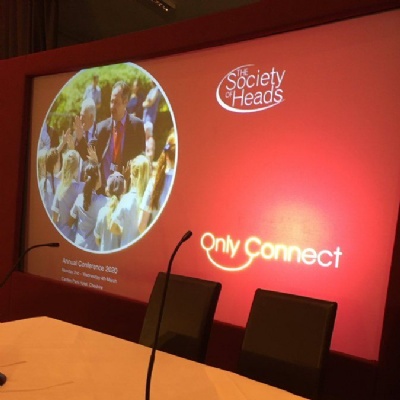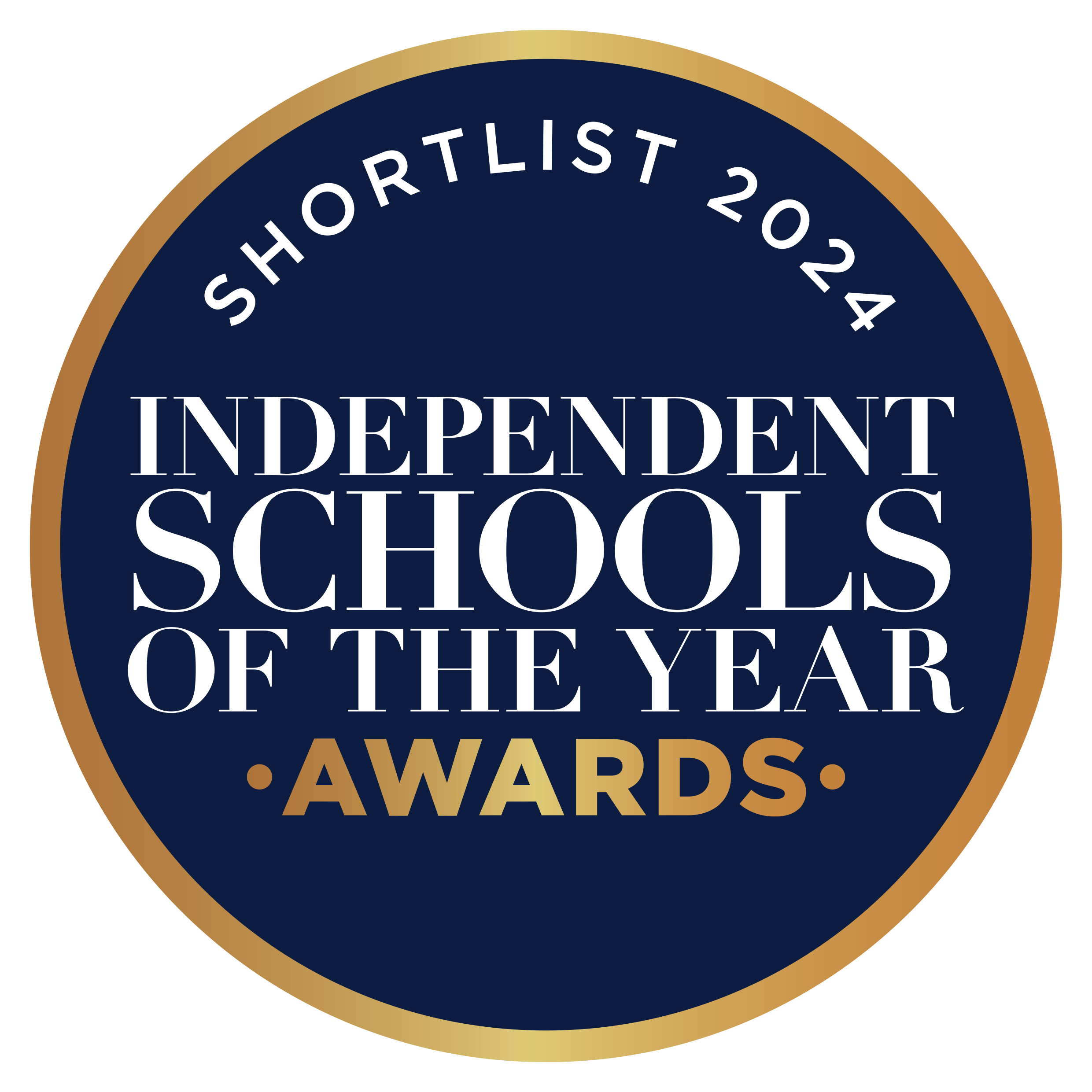

The Society of Heads Annual Conference is taking place this week at Carden Park Hotel near Cheshire, chaired by our Headmaster Roland Martin.
The theme for their 2020 Conference is ‘Only Connect’ and Mr Martin opened the conference with a welcome speech on Monday 2 March alongside the CEO, Clive Rickart.
Guest speakers during the conference include Gyles Brandreth who will be talking about the nature of leadership in the twenty-first century and exploring the challenge of creating communities where ‘success’ and well-being can go hand in hand. Mr Martin will be introducing former Freemen’s pupil Professor Andrew (Bod) Goddard, President of the Royal College of Physicians whose speech looks at ‘Connecting Expertise: Education & Health - More in Common’.
Today, we are thrilled our Upper 6 Theatre Studies class have been invited to show an excerpt from their scripted performance piece, Caryl Churchill’s ‘Love and Information’.
The students are looking forward to representing the School at such a prestigious and influential event while testing out a substantial excerpt from their A-level exam piece in front of a large and discerning audience three weeks before their performance, greatly strengthening their command of the piece at a crucial stage. They will learn about the challenges of different venues, develop their esprit de corps by “touring” the show, and have the experience of performing a piece of cutting edge, high-quality literary drama in front of an expectant but supportive audience.
A copy of Mr Martin’s opening speech follows below.
Welcome from Roland Martin, Chair of The Society of Heads to the Annual Conference at Carden Park Hotel, Cheshire, Monday 2nd March, 2020.
It is a great privilege and pleasure to welcome you to Carden Park for this year’s Annual Conference. I am very humbled by having had the chance to Chair an Association I hold in great affection this year; to follow in the steps of colleagues for whom I have an enormous amount of professional respect and to be in the company of a loyal, collegiate and professional body, many of whom are friends. Thank you for the opportunity.
I extend a particularly warm welcome to our guests, in particular to my own Chair who has been hugely personally and professionally supportive this year, especially in understanding the importance of this responsibility. It is lovely to have Patti MacDonald who joins us as a guest from CAIS for the first time but who is also singing for her supper later, bringing some interesting insights into initiatives at the fore in Canadian independent schools.
“Only connect! That was the whole of her sermon. Only connect the prose and the passion, and both will be exalted, and human love will be seen at its height. Live in fragments no longer.”
The epigraph to E M Forster’s Howard’s End provides the theme for this year’s conference and perhaps gives us a focus as to where some of last year’s ‘New Horizons’ should be.
Forster – a visionary – provides us with plenty of food for thought as Heads trying our best to navigate a sea of uncertainty and make apposite decisions that will bring the best outcomes for the pupils in our schools. Central to Howard’s End is the examination of whether we as humans are isolated or inter-connected and we can ask that of ourselves, as school leaders; of our schools, as we consider their place in our local communities and of our sector as we continue to face a critical examination of our relevance in a political climate that quite rightly wants to see greater social justice in our country.
Forster would have understood the conflicts that many of our pupils – living in such a challenging and uncertain world – face. Forster struggled with his sexual identity in a society that would not have been accepting of it and hence would have empathised with the challenges that many of the children that we are educating have in this regard. A writer who – possibly better than any other male modernist – writes so well about women would certainly have engaged with Laura Bates tomorrow, were he here and I hope that we find challenge in that session.
Forster’s short story The Machine Stops, my first encounter with his writing in E1 at Rendcomb College while doing my O Levels, prophetically explored ‘the progress of the machine’; its rotagonist, Vashti, is in complete isolation but never alone, perhaps like a late night or weekend stint at the office for a Head. Forster wrote The Machine Stops not too long after the telephone had been invented and died ten years before Sir Clive Sinclair entered the home computer market with the ZX80. A man who asked whether technology would make us more or less connected in 1909 would have had plenty to say about social media, fake news and society’s reliance on technology at the expense of real human connection.
(I do realise, by the way, that in asking for us to have access to a Conference App this year, there is an irony about my critical tone at this point and should register sincere thanks to Engage and to Jill Howard for making this happen!)
In the headhunting manual of global executive recruiters, Heidrick and Struggles, the qualities that it is suggested that future employees desire are:
1. a thriving mindset;
2. a deep commitment to learning;
3. situational awareness;
4. empathy;
5. optimism.
The sixth asset they desire is a clear sense of purpose. This latter point is relevant – and the reason that I think the mutual benefit to children from independent and state sectors in meaningful partnership work which Dr Catherine Knowles will no-doubt touch upon later is so important. It is relevant not least in the context of a Gallup Poll completed a few years ago from 133k people around the world in 135 countries. The poll revealed that the world faces a shortage of purpose.
And a lack of wellbeing. Only 18% of people overall in the world felt they have a purpose, and in Europe, that figure was a meager 22%. This is a dis-connected global picture. The good work that our schools do with the limited resources that we have to engage pupils with their local communities through partnership, Duke of Edinburgh, Community Service, enrichment projects and the like is doing much more than justifying charitable status for those who have it; it is giving our pupils and often the pupils from other schools a sense of purpose.
Perhaps these percentages do not shock you. But they might disappoint you. I should suggest that it is no wonder that the percentages are as low as they are given the behaviours that we have developed as humans: demanding instant gratification and satisfaction; becoming increasingly self-indulgent and self-absorbed; thinking less of others. This is a challenge for us in our own lives and it is certainly a challenge in the context of the children that we are educating. Re-connecting has never been more important.
I mentioned earlier our sector’s relevance and I very much hope that the panel discussion later this afternoon will provoke thought and challenge. The Independent Schools’ Council which has responsibility for representing the sector across Associations has – as you know – been countering the challenge of anti-independent school feeling and I am glad that our schools have provided an authentic voice to this argument as we have seen a few moments ago with the excellent short film featuring parents from Derby Grammar School. It is good to have both Barnaby and Julie with us this year and I am sure that they will both be keen to have conversations in between sessions. I expect they may tell you that we should not be complacent in the light of the December election result; independent schools are unlikely to win political popularity contests and we must continue to do our very best to contribute to the social justice agenda in whatever way we can.
When hostility towards our sector was at it’s worst at Labour’s Conference, the petitioning that ISC did and the support shown by ASCL through Geoff Barton’s superbly argued piece in The Times Educational Supplement, which I am sure you have read, was swift and purposeful. ASCL’s Independent Schools Representative, Barbara Stanley, is once again our guest and with retirement on the horizon, I wanted to thank you, Barbara, for all of the work that you have done to represent the sector over the years.
It is imperative that our Schools and our voices remain heard in the national debate; independent schools are hardly represented proportionately by pictures of boys in tailcoats (yep – get the irony here as well!) and the good work that we do, perhaps in particular for families who make very genuine sacrifices to educate their children with us or for whom the generosity of means-tested bursary awards provides transformative opportunity is a hugely important narrative to tell. I am tired of reading in the press that over 40% of ‘influential’ people were educated independently when the statistics do not tell the complete picture. How many of those success stories were at an independent school on an Assisted Place, bursary or a traditional ‘scholarship’; at the expense of the Government; were there because their parents were teachers or members of the Clergy or Armed Forces? Only last week I had a leading businessman and local Councillor in my office who was brought up in the East End with no bathroom or inside toilet but who was gifted an education at an independent school because his academic potential was spotted, a gift that I can well appreciate given my own background. These are the real stories for us to tell.
Central to making sure that our voice is represented is of course the excellent work that is done in Market Harborough. Our Chief Executive Officer supports us as individual members and advocates for us as an Association tirelessly and his voice is always measured and reflective. It has been a privilege to see at closer quarters a little more of what Clive does this year and in particular in the context of Association meetings where he represents us so very effectively. We are most fortunate to have such measured and principled leadership.
As the Continued Professional Development opportunities have expanded in the last few years - with 25 now being offered against the 5 being run five years’ ago - so has the workload and Jill Howard has taken a lead in supporting us, and the colleagues in our schools, in this area as well as in others. Julie Andrews has worked tirelessly for the Society over sixteen years and it was with great sadness that I learned recently that retirement – and no-doubt more time at Welford Road – means that this will be her last Conference with us in an official capacity. There will of course be time to say appropriate words but for the moment, Julie, I very much hope that you will enjoy this, your sixteenth Conference, and thank you for the support that you have given.
Supporting Market Harborough are the contributions made by the Committees and the work done in these forums is critical to the support that we can offer. I am hugely grateful to the 40 busy Heads who serve in this capacity and do fantastic work. I would recommend Committee work to those of you who do not currently serve; I am forever grateful to David Boddy for encouraging me in this regard when he was Chair of the Society and the experience has been rewarding and enriching. One of the strategic imperatives of the last couple of years for the Main Committee has been to enhance connection through regional meetings, part of Damian Ettinger’s vision as Chair and I hope that the opportunity to discuss relevant issues both national and local will again be helpful.
EM Forster would argue that we should channel our greatest energy into human emotions and I hope that this Conference, more than anything, will give you the time and space to connect and to reconnect, not least with your own wellbeing and with the prospect of good company. There are opportunities for us to join together collegially but formally at meals and at tomorrow’s Conference Service, which I hope will be a highlight as we have not had one for several years, as well as informally in the bar and at our leisure break. I am grateful to sponsors who have been generous in supporting us this year and hope that we will in turn support them during the course of the next two days.
If we update ‘telegrams’ with ‘emails’, Howard’s End has a final lesson as we begin the Conference:
‘Personal relations are the important thing for ever and ever and not this outer life of telegrams and anger.’









.jpg&command_2=resize&height_2=85)
.png&command_2=resize&height_2=85)
%20(1).jpg&command_2=resize&height_2=85)











